Have you ever heard a speaker at the UN Security Council sing like Martin Luther King at the end of his speech? That is what happened Tuesday at the UN Headquarters, but the hymn to Russia was not Roger Waters from Pink Floyd, but Raymond McGovern, an analyst who has served the CIA in that capacity for 27 years, as head of the Soviet Foreign Policy Branch.
There were very few journalists waiting outside for the protagonists of this unprecedented and, at times, spectacular meeting. An explosive debate resulted in “fireworks” as Russia once again asked the United Nations to lead investigations into last September’s Nord Stream pipeline explosion in the Baltic Sea.
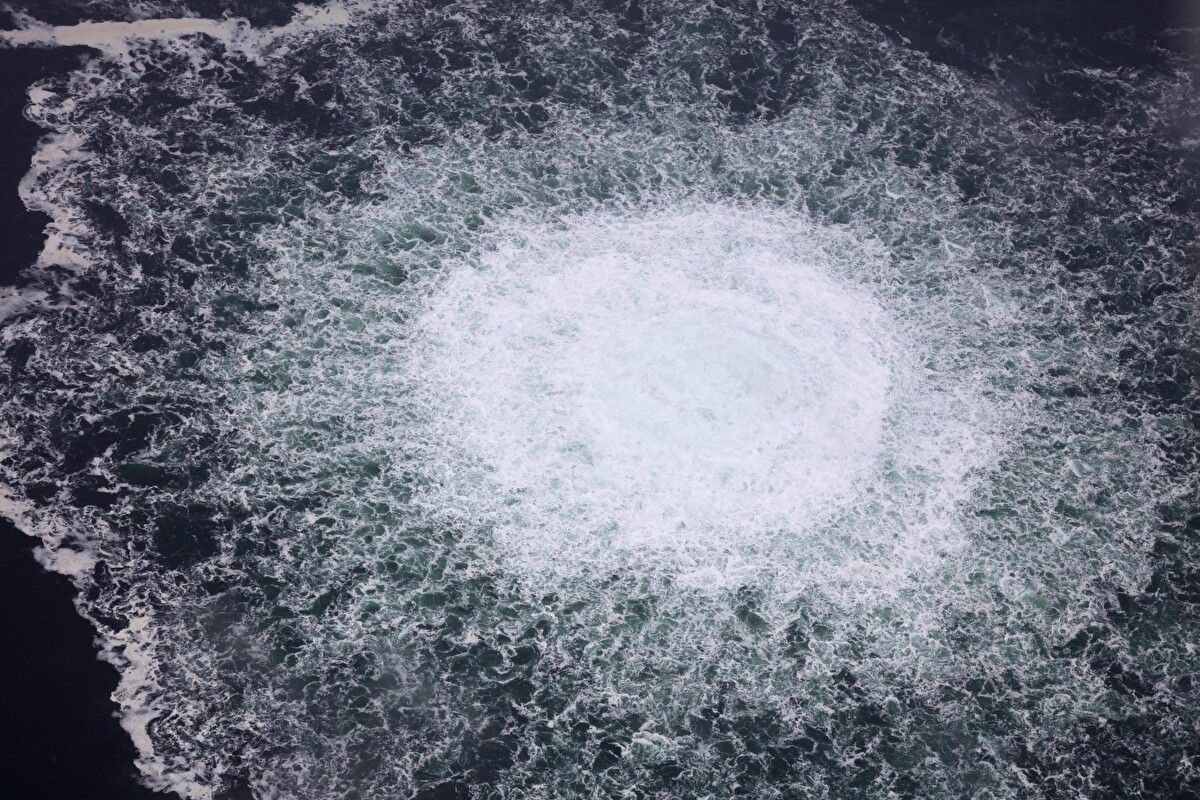
The meeting was sprung after the alleged “scoop” published by Seymour Hersh, the famous Pulitzer prize- winning journalist published an article in his blog two weeks ago accusing the United States as the culprit. According to Hersh’s “source”, President Joe Biden had ordered the pipeline to be bombed. But let’s go in order.
At the beginning of the discussion, the under-secretary-general of the United Nations for Political and Peacebuilding Affairs, Rosemary DiCarlo, attempted to set the tone of the discussion, urging all parties to “show constraint and avoid any speculation” given the delicate topic.

“We should avoid any unfounded accusations that could further escalate already heightened tensions in the region and potentially inhibit the search for truth,” DiCarlo affirmed.
At the same time, DiCarlo explained that the United Nations “is not in the position to verify or confirm any of the claims relating to these incidents and we await the findings of the ongoing national investigations.” In fact, there are three countries, Denmark, Switzerland (in which water and gas pipes have exploded), and Germany (to which Russia directly supplied gas), which are carrying out an investigation.
DiCarlo stated that the preliminary results of the current investigations show “extensive damage”, signs of “serious sabotage” and “foreign items” seized from the site. She affirmed that while it is not yet clear what happened underwater in the Baltic Sea in September 2022, “One thing certain: Whatever caused the incident, its fallout counts among the many risks the invasion of Ukraine has unleashed.”
A year since the beginning of the war, DiCarlo finished, “We must redouble our efforts to end it in line with international law and the UN Charter.”
When the floor was given to the experts called by Russia to intervene, the first was a familiar face to the Security Council: Professor Jeffrey Sachs, Director of the Center for Sustainable Development at Columbia University. While an expert on sustainable development, a topic he frequently speaks on at the UN, this time he underlined the dramatic environmental consequences of the explosion, calling it an “act of international terrorism” representing “a threat to peace”. To Sachs, the Security Council itself must assure the perpetrators are brought to “international justice” while scrutinizing the “compensation to the damaged parties.”
According to the authoritative academic from Columbia University, the destruction of the Nord Stream pipeline required a very high level of planning, competence and technological capacity. Only a handful of state-level actors possess both the technical capacity and access to the Baltic Sea to carry out such an action. “Including the United States, Russia, the United Kingdom, Poland, Norway, Germany, Denmark, and Sweden, either individually or in some combination.” Sachs claims that Ukraine does not have access to the necessary technology, nor does it have access to the Baltic Sea. Sachs observed that a recent report released by NATO countries’ intelligence agency had concluded that there is no evidence that the Russian Federation carried out the bombing. According to Sachs, between Denmark, Germany, and Sweden, it is the latter that would have the most information to share to the world about the crime scene. “Sweden has kept the results of its investigation secret from the rest of the world.” According to Sachs, “The UN Security Council should require these countries to immediately turn over the results of their investigations.”
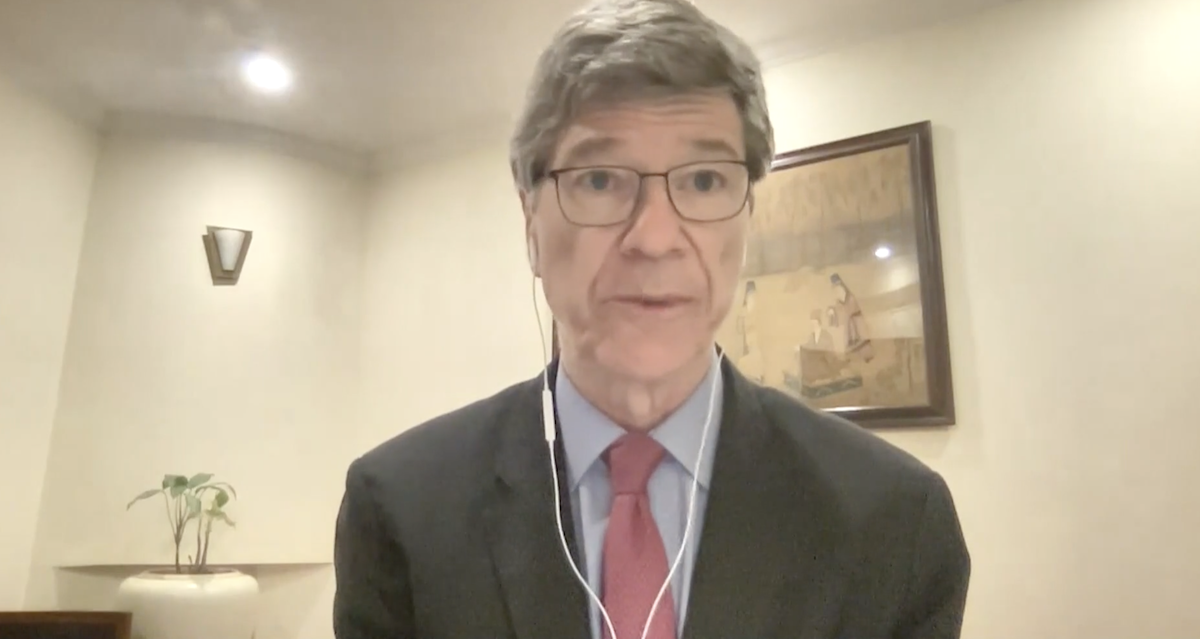
In the detailed report issued by investigative journalist, Seymour Hersh, the Columbia University professor affirmed that the destruction of the Nord Stream is attributed to an order mandated by the President of the United States and carried out by American agents in a secret operation. The Biden administration described Hersh’s investigation as “completely and totally false,” but did not offer “any information contradicting Hersh’s account and did not offer any alternative explanation.”
In the end, Sachs closed noting that the world will reach safety only when the permanent members of the Security Council work together diplomatically to resolve the global crisis, including the war in Ukraine and the rising tensions in East Asia.
After Sachs, came the “shimmering” speech from Raymond McGovern, presenting as an ex-CIA analyst and a “political activist”. Previously, McGovern has been known for denouncing the US’s invasion of Iraq in 2003 claiming it was “based on lies”. He acknowledged the definition of “political activist” in his speech saying “these are my personal remarks based on my experience for 27 years as an intelligence analyst. This is my way of paying back.”
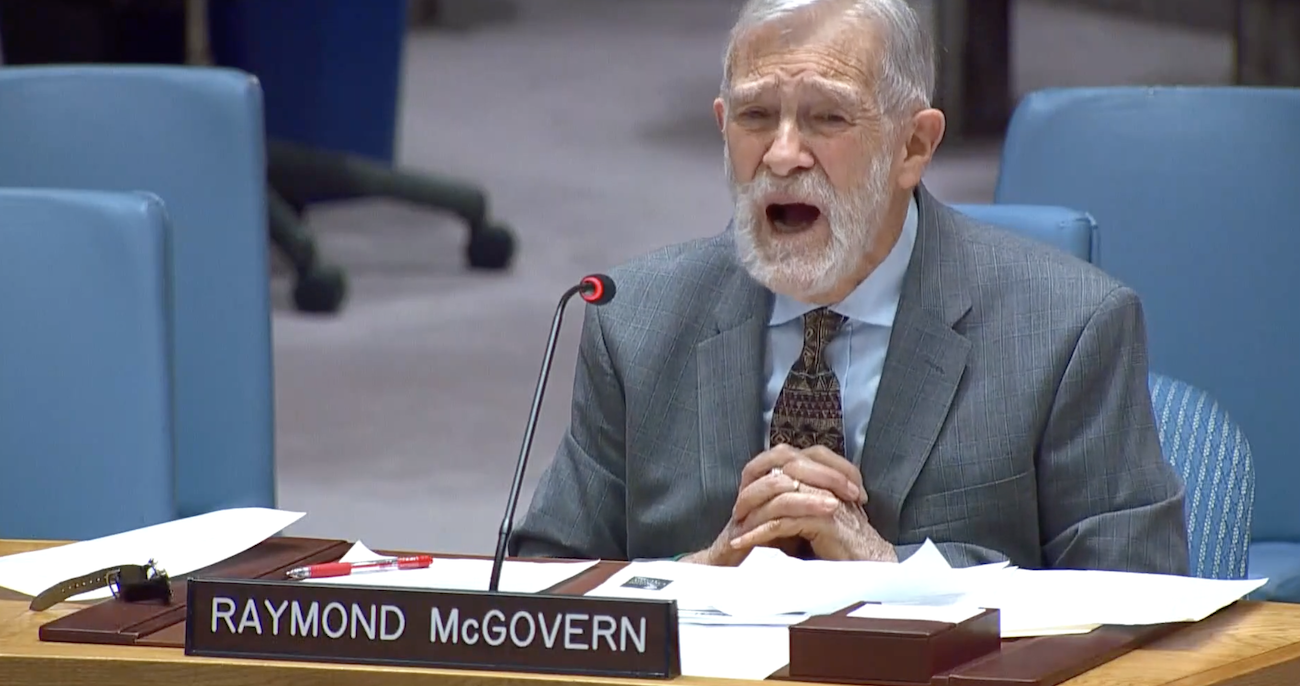
McGovern first tried to prove how the journalist Seymour Hersh had always been reliable in the past; meanwhile, the CIA had attempted to discredit the article. “I have to confess, being an alumnus of the CIA that our PR people do not have a very good record,” he stated. McGovern recalled the episode, which took place 20 years earlier in the Security Council chamber, when Colin Powell presented the CIA’s “evidence” on Saddam Hussein’s Iraq, which proved that he still had “arms of mass destruction”.
“Just days before that meeting, Newsweek received a tip about a CIA document proving that the agency had known that Iraq had eliminated all its WMDs before 1995. But when the article came out, in 2003 the CIA denied the document, and all the newspapers believed it. The core of McGovern’s speech is that presently, the CIA and other US governmental agencies are humming the same tune with Hersh’s article. The ex-CIA agent then explained, “People like me are sworn to defend the Constitution of the United States from enemies outside and inside.” McGovern believes Hersh’s “sources” are probably someone who actively participated in the CIA operation and who now serves as an award-winning and credible journalist to act under, and defend the Constitution.
McGovern went on to argue that it is necessary to really understand what exactly worried Putin. “It’s more than just NATO enlargement.” McGovern speculated on Putin’s thought process claiming he felt the need “to annex Crimea because of the coup in Kiev in February of 2014.” According to the former analyst, expert in nuclear warfare under the Nixon, Ford, Carter, Reagan, and Bush administrations, and who worked precisely on the signing of treaties for the control of nuclear arms between Washington and Moscow, the regime in Russia was furious not only because of the NATO expansion and that Ukraine wanted to participate, but above all knowing the placement of the strategic nuclear weapons was “already operational in Romania and Poland”. They are disguised as anti-ballistic missile defense systems but can easily accommodate cruise and hypersonic missiles.
Finally, McGovern, who didn’t have a prepared speech, but read from several of his notes, asked for the Security Council’s attention to listen while he sang a song by Martin Luther King. He sang, “We are going to keep on moving forward, never turning back. We are going to keep on loving our enemies, never turning back.” The former CIA analyst finished practically begging the Security Council to seek a peaceful solution and to avoid the abyss of nuclear conflict.
When the floor was yielded to the Russian ambassador, Vassily Nebenzia, in a few seconds of pause, the Council appeared equal parts surprised and disturbed by the scene that they had just witnessed.
“We are not here to institute a trial in the Security Council,” the Russian ambassador Nebenzia said, explaining that Moscow is presenting a request for an independent investigation, doubting the integrity and transparency of Denmark, Germany, and Switzerland in their current, ongoing investigations. The ambassador then asked for the Secretary General of the United Nations, Antonio Guterres, to lead the investigations of the exploded pipelines. “He is someone we trust.”
The Russian ambassador also referred to Hersh’s article in his speech claiming that there is evidence that the United States “planted explosives” close to the pipeline during a NATO exercise in summer of 2022. “The American journalist is telling the truth”, Nebenzia said to the members of the Council. “This is more than just a smoking gun that our American detectives love in Hollywood blockbusters. It is a fundamental principle of justice; everything is in your hands and we can solve it today”.
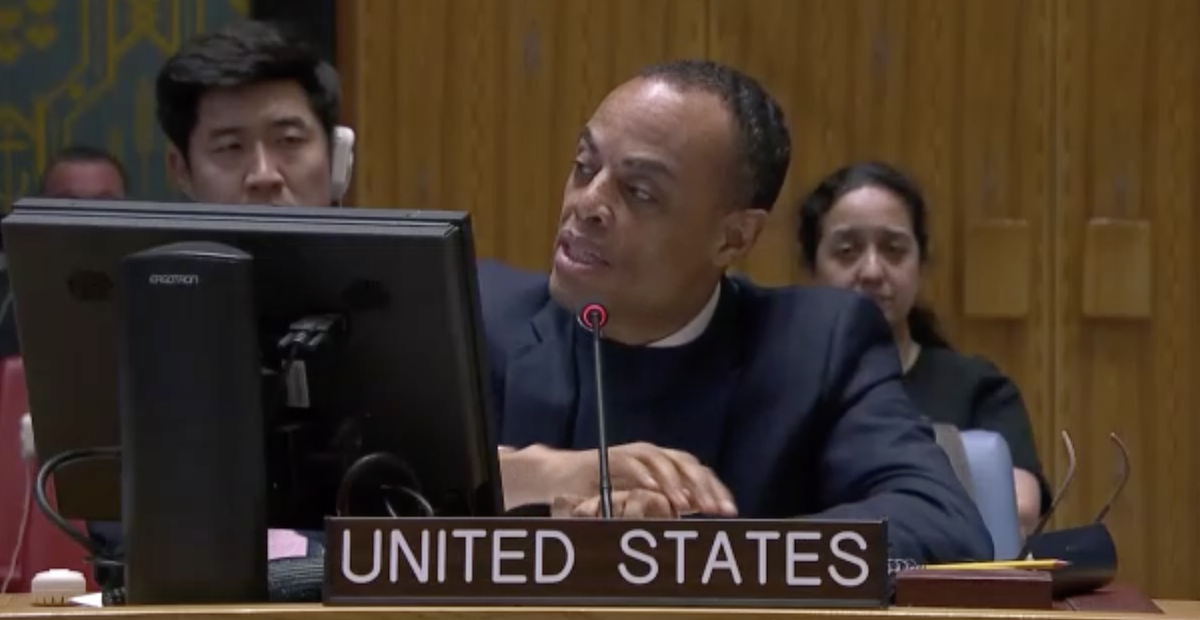
The American ambassador, John Kelly, who attended in Linda Thomas Greenfield’s stead, replied stating that “today’s meeting is a blatant attempt to distract” from the imminent emergency meeting of the General Assembly that will mark one year since Russia’s invasion of Ukraine on February 24th, 2022. “This is what we should focus on” the representative of the United States said, “Russia is desperately trying to change the subject.” The American diplomat then accused Russia of “abusing its position as a permanent member of the Security Council” and for using the platform to broadcast conspiracy theories written on the internet (Hersh’s article was published in his blog).
When the meeting concluded, none of the ambassadors came to the the stakeout, so we followed the Russian ambassador, Nebenzia, in the hallways of the UN to ask him a few questions.

Ambassador, are you satisfied with how the Security Council meeting went?
“I took from the meeting that they had nothing to say. They tried to shift the focus to other things, pretending that this is not a serious matter. The matter is serious. It has been from the beginning it is just now coming to the surface that it is more serious than first thought.”
Are you satisfied with UN Under Secretary DiCarlo’s statement?
“When they want to, they rush to (make) investigations even on matters which are beyond the UN prerogatives but here they want to get the results of the investigation, an investigation which we don’t know anything about because the countries that investigate don’t share with us. Only Seymour Hersh, who wrote the information, shared something with the public. We don’t know what Denmark, Germany, and Sweden are doing on the investigation. We have no information. They refuse to cooperate with us.”
Did you try to talk with Seymour Hersh?
“No, first, when we invite somebody to Security Council briefings, it is their sovereign will to come. Secondly, we do not tell them what to say. We neither told Jeffrey Sachs nor Raymond McGovern what to say. It was their choice on what to talk about. We thought they were appropriate briefers because they could add value to what we were discussing. We thought that they did.”
McGovern, the ex-CIA analyst spoke on other topics as well. He was talking about the life of children in danger. He hinted that if attitudes are not changed there is risk of nuclear conflict.
“He impressed me…he did.”
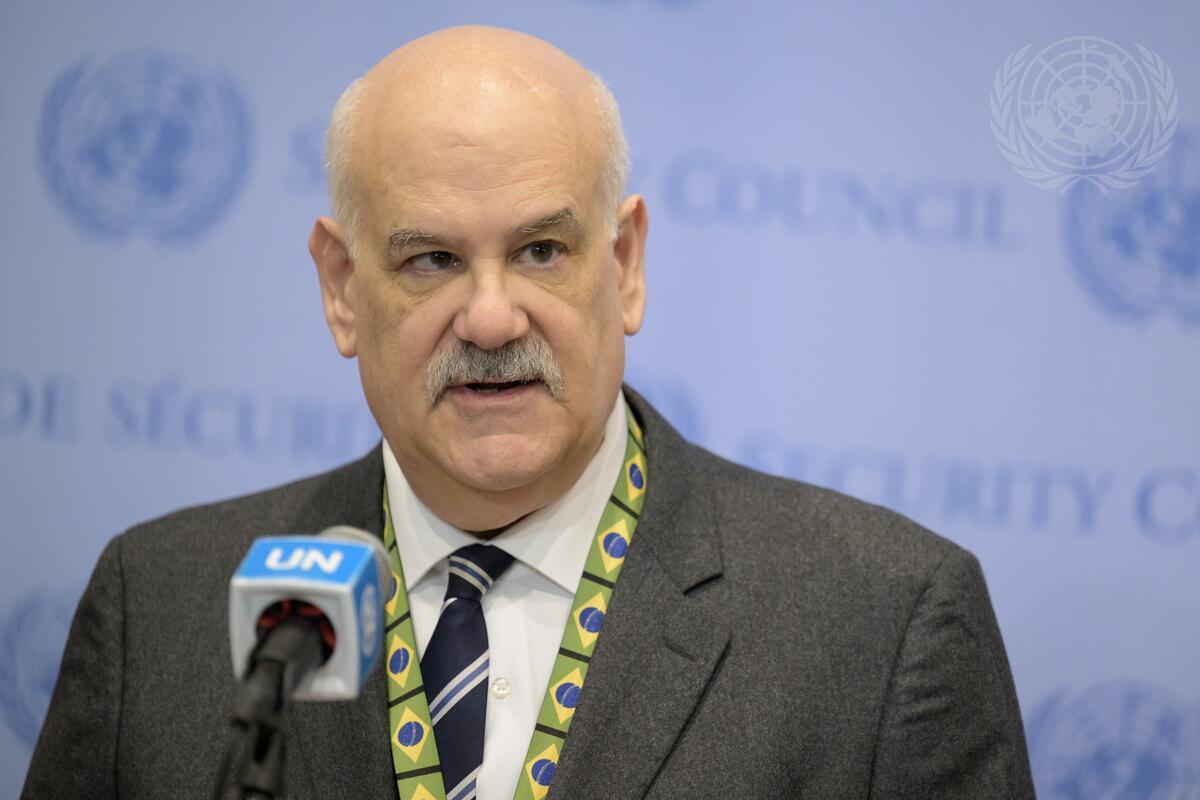
We also spoke with the Brazilian ambassador, Ronaldo Costa Filho, “permanent” representative of Brazil, one of the few that had participated in the meeting where almost all of the heads of mission were replaced by deputies or even never-before-seen diplomats (not even the ambassador of Malta, Vanessa Frazier, president of the UNSC was present. Deputy Darren Camilleri attended in her stead). We asked the Brazilian ambassador if the meeting was a waste of time or if the matter was important for his country. “Yes, it was important. There was a discussion amongst the members and that is never a waste of time. For Brazil, everything discussed in the Security Council is important. That is why we also want to reform the Security Council, because it is flawed. We want a reform because we believe the Council is a vital organ of the United Nations.”
Translated by Ian Udulutch











